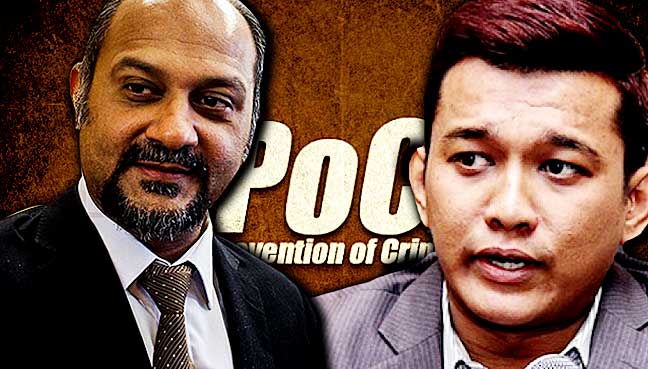A Local NGO Leader Is Being Detained For 21 Days Without Trial Under POCA
A human rights group said that the situation is a "dangerous trend".
In less than a month, an NGO chairman was released and rearrested under different allegations for nine times, until he was subsequently remanded for 21 days
Malaysian Crime Watch Task Force (MyWatch) chairperson R Sri Sanjeevan has been remanded for 21 days, according to his lawyer Preakas Sampunathan.
Preakas said the remand under Section 4(1) of the Prevention of Crime Act 1959 (POCA) was granted by a magistrate's court in Kuala Lumpur during a hearing at 11am on Monday, 11 July.
"We have raised an objection that he (Sanjeevan) does not fall under a registrable category of the First Schedule of POCA, and he has already been held for (19 days) for other offences," he told Malaysiakini.
Despite his arguments, Preakas said, the magistrate granted the full 21 days allowed under Section 4(1), which can be further extended by 38 days.
The exodus began when the police first arrested Malaysian Crime Watch Task Force (MyWatch) chairperson R Sri Sanjeevan in Nilai, Negeri Sembilan on June 22 for allegedly extorting RM25,000 from a gambling den operator
According to Bukit Aman CID Director Mohmad Salleh, a police report was filed by an unnamed complainant who said that the crime watchdog leader had threatened to spread slander about him through Facebook unless he paid RM25,000 in protection money.
Following the report, the police arrested the 32-year-old and his driver after the complainant allegedly handed the money to Sanjeevan in his Toyota Vellfire near the Nilai Toll Plaza.
It was reported that cash amounting to RM41,080 and five cellphones were also seized.
Following his detention, Sanjeevan has sought the assistance of Opposition leader cum lawyer, Gobind Singh Deo to be his lead counsel
It was reported that Sanjeevan himself had requested for Gobind's services in challenging the latter’s arrest under the Prevention of Crime Act (POCA).
Gobind said that he hoped to file an application by today, 13 July.
"In the application, we will look at various angles, which include among others, challenging the validity of the detention under POCA and aspects of what in law is known as mala fide (undertaken in bad faith) and abuse of process," he was quoted as saying by FMT.
"I will not go into that for now as the application has yet to be filed and out of deference to the court."
Meanwhile, human rights organisations in Malaysia are deeply concerned over the use of the "draconian law" against civil society as demonstrated in Sanjeevan's case
"The use of POCA in such a manner effectively reintroduced ISA (Internal Security Act) into the civil and political discourse in Malaysia and this dangerous trend must not be allowed to continue," Suaram executive director Sevan Doraisamy reportedly said in a statement yesterday, 12 July.
"In these trying times where Malaysia is subjected to threats from terrorism, the police must not tarnish their image in such a manner as it would weaken public trust and jeopardise the safety and interest of the public," he added.
Malaysians Against Death Penalty and Torture (MADPET) coordinator Charles Hector echoed Sevan's concern, saying that Sanjeevan's arrest and detention "may be the advent of the usage of POCA against other civil society organisations and human rights defenders".
"This law (POCA) allows for the avoidance of the right to be heard and/or the right to a fair trial. A suspect can simply be subjected to Detention Without Trial (DWT) and Police Supervision (or Restriction) Orders without first being proved guilty in court," he was quoted as saying by Malay Mail Online.
POCA, along with other laws such as Security Offences (Special Measures) Act (SOSMA), Prevention of Terrorism Act (POTA), and Dangerous Drugs (Special Preventive Measures) Act are compared to the highly controversial ISA which was abolished in 2011
These laws are compared to the Internal Security Act (ISA) because they also allow for detention without trial.
ISA was highly controversial due to the alleged draconian nature of the law, and because it was notoriously used to detain many activists and opposition politicians during Operasi Lalang in 1987.
Prime Minister Najib Tun Razak had abolished ISA in 2011 but it was replaced and repealed by SOSMA.


